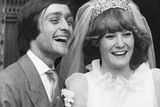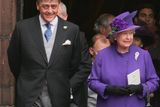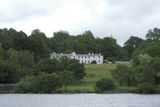Duke of Westminster death: How idyllic childhood deep in the Fermanagh countryside left a lasting impression on sometimes troubled Duke
All his life the late Duke of Westminster had a deep affection for Northern Ireland, where he enjoyed a bucolic start to life. David Dawson talks to locals who recall the spirited boy who grew up to find his vast wealth could also prove a burden




Despite being Britain's richest aristocrat, with a fortune estimated at more than £8bn, the Duke of Westminster never forgot his humble upbringing near Enniskillen in Co Fermanagh.
The sudden death of Gerald Cavendish Grosvenor at the age of 64 at the Royal Preston Hospital in Lancashire on Tuesday has been keenly felt in the place he once described as "idyllic."
Born in Omagh, Co Tyrone, he grew up at Ely Lodge, a secluded country mansion on the opposite side of Lough Erne with his sisters Leonora and Jane, who became in due course the Countess of Lichfield and the Duchess of Roxburghe.
More:
With a keen interest in the rural surroundings, the Duke, who didn't inherit the title until he was 27, once recalled how popping down to the corner shop to buy sweets was always "a bit of a safari."
Ely Lodge, which he said gave him a "swallows and Amazons" childhood, was where he got to explore the great outdoors such as traversing the vast estate which comprised 1,000 acres in Fermanagh and 1,500 acres in Tyrone, fishing and boating on Lough Erne.
The family yacht was called Trasna and was moored at the jetty near Ely Lodge. Trasna, 54 feet in length, was built at Bangor shipyard around 1968, and could hold up to 16 passengers.
The widow of the family's former butler and chauffeur, who lived at Ely Lodge, recalls the young Duke whom she fondly remembers as "a cheeky chappy."
"We went to live at Ely Lodge when our son wasn't even walking. We lived in the stables where the Duke and Duchess had lived prior to that. That's how we first met them. The garage was where the cars were kept and so we saw the family quite often.
"Gerald was like every boy, he was a boy, a lad. Sometimes he was a little cheeky and would have acted the cod about the place. He would get into the car with dirty feet and when my husband said, 'If you do that again I'll tell your dad on you,' he would laugh at him. He was a rascal.
"Gerald would have asked my husband for a cigarette but he wouldn't give him one. One day, however, he did and the father happened to walk by and found Gerald smoking. He sent him to his room for a week and he wasn't allowed out."
The former Enniskillen woman, who prefers to stay out of the limelight and asked not to be named, says the Duke's mother, Viola, the Duchess of Westminster who died in a car crash, "was soft on him" while his father was much the opposite.
"Gerald used to ride horses and go boating. If my husband was down cleaning the boat, he used to go out on it. He would spend a lot of time running after him, like every youngster Gerald was just a lad. He was a friendly lad, we saw him through all the holidays; he and his sisters used to go exploring the islands in the Lough Erne but they wouldn't tell their mother and father.
"He used to drive a Mini around the estate and as soon as my husband washed it he would have driven it through the dirtiest part of the yard. My husband would have peace for a day or so and then it would be the same again.
"He always wanted to go into Enniskillen and would have asked my husband to bring him into town. He was just a typical young boy," she told the Belfast Telegraph.
"I am saddened by his death. He did a lot of good throughout his life," she added.
When he was just seven years old, the young Gerald was sent to prep school in Sunningdale, Berkshire. He wasn't to shine in the world of academia, though, and later left Harrow with only two O-levels in English and history. "I was not motivated at school. I was unhappy. I never applied myself. I found it very difficult to make friends," he later said. "I did not need O-levels to lead, to have judgment, to make decisions and to be decided."
At 15, it seems, he began to grasp the full implications of his destiny when his father told him of his likely inheritance. It was anathema to him. "It almost made me run for the door, slam it and keep running," he recalled years later. "The implications were daunting. In Ulster I was called Gerald all my life and there was no question of titles, 'Your Grace this, Your Grace that'. I find it very embarrassing when people ask what they should call me - then, I stumble."
The Duke's 21st birthday party was held at the Killyhevlin Hotel in Enniskillen and was organised by the owner Raymond McCartney. It wasn't all fun, however. As a young man, Gerald had to start learning the management of the family estates instead of taking up an Army career as intended, though he did go on to serve with the Territorials, eventually becoming a major-general and assistant chief of the defence staff with responsibility for the Army reserves and cadets.
Ironically, the Duke wasn't meant to inherit the title and had always rather hoped he would end up a beef farmer, but after his uncle died without heirs, his father, Robert, inherited the title. He said in later life that "the accident of inheritance" had taken him away from the simple life of a farmer like his father.
His father, Lieutenant Colonel Robert George Grosvenor, 5th Duke of Westminster, was the Ulster Unionist MP for Fermanagh and South Tyrone and one-time parliamentary private secretary to Edward Heath. The UUP's Tom Elliott, the area's current Westminster MP, said like his father, the Duke "served the people of the constituency well."
"Even when he had left Fermanagh the county was never far from his mind. He would have taken a great interest in the people and in particular the farming industry. He would have asked about local agriculture and business. He was particularly interested in knowing how the High Street was doing and if the businesses were able to compete against the multi-nationals," he said.
Mr Elliott described the Duke "as a man of the people who always looked out for the vulnerable."
"He was always down to earth, was always as comfortable talking to ordinary people like me as he was mixing with the more elite members of society. He never forgot his roots," he said.
First Minister Arlene Foster, the MLA for Fermanagh South Tyrone, spoke to the Duke when he attended a memorial service for Lord Erne at St Macartin's Cathedral in Enniskillen in May.
"By attending that memorial service and coming back to Fermanagh he showed the affection that he had for the county. I do think this area played a big part in his life.
"He always thought he was going to be a beef farmer, he wasn't born to be the Duke. He didn't have a lot of airs and graces, he wasn't the kind of person who you felt intimidated by, he was very pleasant," Mrs Foster told the Belfast Telegraph.
The Duke, a friend of the royal family, was said to be the 68th richest billionaire in the world, and third in the UK. But he once said: "Given the choice, I would rather not have been born wealthy, but I never think of giving it up. I can't sell. It doesn't belong to me." When he appeared on BBC Radio 4's Desert Island Discs in 1995, he gave a further insight into how his vast wealth had not perhaps always sat easily with him: "In the context of eternity, if I am lucky I might live 70 years, but this estate has been with us for 3, 4, 5, 600 years. I am only a mere flicker in the process of time. It is what I do with it, rather than what I am worth, that I believe is more important."
In 1998, the Duke suffered a nervous breakdown and depression, later saying he had become exhausted from the pressures of business and public appearances. He rarely gave interviews and in 1992 talked about how he wanted to teach his son, Hugh Grosvenor, now 25, who will inherit his fortune, "self-discipline and a sense of duty."
"He has to see himself as a caretaker, keeping the estates in good shape in his lifetime. It took me 10 years just to understand what I had inherited. It hasn't been easy."
The Duke supported a number of charities and good causes, including making a £500,000 donation to farmers during the foot-and-mouth outbreak in 2001.
The Queen and Duke of Edinburgh have sent a message of condolence to the Grosvenor family while the Prince of Wales and Duchess of Cornwall said yesterday they were "deeply shocked and greatly saddened" by the sudden death.
A spokeswoman for the Grosvenor family said on Tuesday: "It is with the greatest sadness that we can confirm that the Duke of Westminster, Gerald Cavendish Grosvenor, died this afternoon at Royal Preston Hospital. He was taken there from the Abbeystead Estate in Lancashire where he had suddenly been taken ill. No further comment will be made for the time being but further information will follow in due course."
Additional reporting by Tim Ferres, who blogs as Lord Belmont
Join the Belfast Telegraph WhatsApp channel
Stay up to date with some of Northern Ireland's biggest stories




